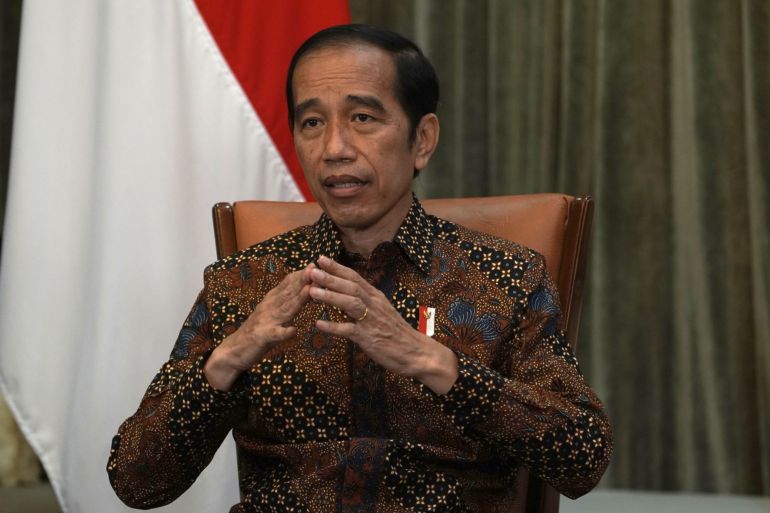Indonesia’s Widodo hails ‘strong’ economy, rising global profile
Indonesian leader says country stands at ‘pinnacle’ of international leadership after winning presidency of G20.

Medan, Indonesia – Indonesia stands at the “pinnacle” of international leadership and its economy is strong enough to withstand global headwinds, Indonesian President Joko “Jokowi” Widodo has said in an annual address to parliament.
Striking an optimistic tone ahead of Indonesia’s 77th independence day on August 17, Widodo said on Tuesday that the country’s economic fundamentals remain strong “in the midst of global economic turbulence” and as “crisis after crisis haunts the world”.
Keep reading
list of 4 itemsPapua New Guinea fails to end ‘evil’ of sorcery-related violence
Australia, New Zealand deny ‘rumours’ of meat ban to China
China imposes sanctions on seven Taiwan ‘secessionist’ officials
Addressing the issue of rising prices, the Indonesian leader said inflation had reached 4.9 percent in July, compared with 7 percent across the Association of Southeast Asian Nations (ASEAN) and 9 percent in developed countries.
Widodo said the Southeast Asian nation has also seen its stature grow on the international stage as a result of its ongoing presidency of the G20 and next year’s chairmanship of ASEAN.
“It indicates that we [are at the] pinnacle of global leadership,” said Widodo, who sported a traditional moss green and gold Paksian outfit from the Bangka Belitung islands.
‘Confident’
Deni Friawan, an economic researcher at the Centre for Strategic and International Studies (CSIS), described the speech as “very optimistic and confident”.
“This optimism is good for inviting public participation, but it can also be dangerous and there is a fear of overconfidence,” Friawan told Al Jazeera.
Friawan said that while Indonesia’s economic fundamentals appear to be strong compared with some other countries, the picture has been distorted by government interventions to control steep rises in commodity prices.
“Inflation and exchange rates are maintained at this time, but the cost of doing so is also expensive,” he said. “Inflation is low because we don’t make adjustments to the price of fuel but energy subsidies have risen to IDR 502 trillion ($34bn).”
Like much of the globe, Indonesia has faced supply chain issues caused by a combination of factors including the Ukraine war and high consumer demand following the COVID-19 pandemic.
In his speech, Widodo said Indonesia’s rising international status extended to growing interest in its downstream industries, which involve the processing of abundant raw materials such as crude oil and nickel to allow the export of more expensive finished products.
Widodo said the Indonesian economy grew 5.44 percent in the second quarter of 2022, with a surplus of about IDR 364 trillion ($24bn).
Steel exports reached IDR 306 trillion ($20.7bn) in 2021, an 18-fold increase compared with 2016, and are projected to reach IDR 440 trillion ($27bn) by the end of 2022, the Indonesian leader said.
Friawan, the CSIS researcher, said the government’s focus on downstreaming has had debatable results.
“The president only sees the success of downstream nickel from the point of view of increasing investment and steel exports, but not from carefully calculating the added value that Indonesia actually gets,” he said.
“Keep in mind, having a lot of natural resources does not mean that Indonesia can be competitive for industrial and manufacturing production from the input of natural resources. In order to be competitive, you also need supporting technology, skills, capacity and economy of scale.”
Widodo also referenced his legacy project of Nusantara, Indonesia’s proposed new capital city in Borneo. The project, which aims to raise 80 percent of its funding from private concerns, has been controversial, with some critics saying it will lead to the displacement of Indigenous peoples and could centralise power in ways that may be unconstitutional.
“What is interesting in my opinion is that Jokowi remains committed to carrying out this large project amidst the uncertainty of the economic situation, both inside and outside,” Siwage Dharma Negara, senior fellow at Iseas-Yusof Ishak Institute, told Al Jazeera.
“The president remains optimistic about our economic ability to rise from the pandemic while still advising that we need to be vigilant and careful regarding conditions that are very uncertain.”